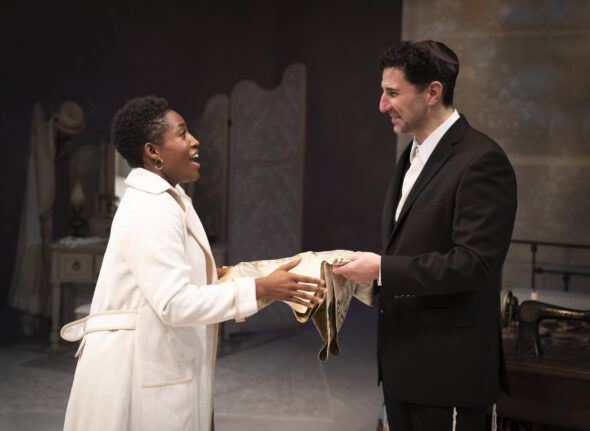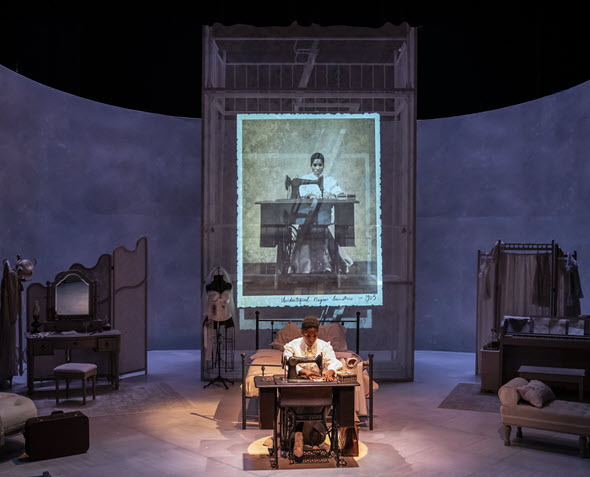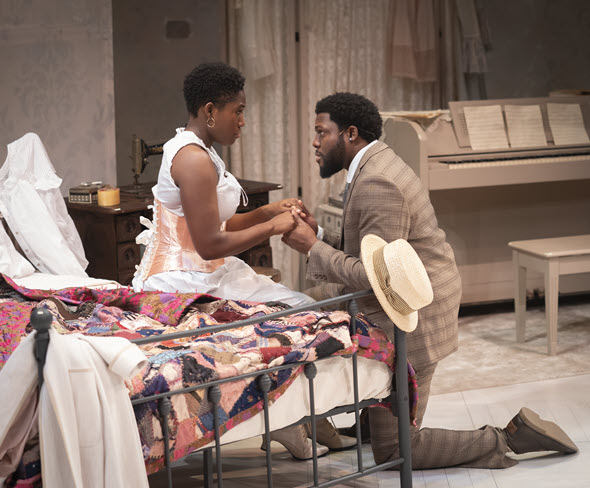For seamstress at the end of her thread, love betrays wrinkles, snags in ‘Intimate Apparel’

Mildred Marie Langford as Esther and Sean Fortunato as Mr. Marks, in “Intimate Apparel” at Northlight. (Photos by Liz Lauren)
Review: Intimate Apparel by Lynn Nottage at Northlight Theatre through May 15. ★★★★★
By Lawrence B. Johnson
In a program note, director Tasia A. Jones likens Lynn Nottage’s play “Intimate Apparel” to old photographs of ordinary people, Black people, who once lived and loved, who were needful of love, who had hopes and dreams. People who lived and died and disappeared, but whose lives mattered. I might add to that plainly spoken insight the flaws and folly of those folks, as well as their basic goodness. Such are the multifaceted, profoundly human images that register in Northlight Theatre’s magnificent framing of “Intimate Apparel,” as finely crafted a show as I’ve seen on that stage.
Esther, an unmarried Black woman in her mid-thirties, is a skilled seamstress who fashions elegant undergarments for a clientele made up largely of white society ladies. It is 1905. For 18 years, Esther has resided in a New York boarding house run by Mrs. Dickson, a wise and pragmatic widow. Ester buys her sewing materials mainly from a Jewish vendor, also unmarried, of about her age, for whom she has perhaps more than tender feelings. And that is her life; thus do its pages turn year upon year. That is until, through a mutual acquaintance, she receives a letter from a man in Panama, a seemingly earnest and charming fellow called George Armstrong.
Against Mrs. Dickson’s sober counsel but urged on by one of her clients, the socialite Mrs. Van Buren, Esther responds to George’s overture, and so begins a letter-writing affair that’s consummated when George comes to New York and, in a dizzy rush, the two are married. Happily ever after does not apply here. Here, Esther’s troubles begin with her impulsive, eyes-open subjugation to a man she doesn’t know at all.
“Intimate Apparel” might be called a misdirection love story. While we’re caught up in Esther’s bizarre long-distance fascination with George, a more subtle, more spiritual connection is evolving between the Black seamstress and the white Jewish vendor of fabrics. This is where Nottage’s play waxes rhapsodic and where the drama under Jones’ sensitive eye (and ear) glows deepest. The touchless meetings between Esther (Mildred Marie Langford) and the Hasidic Mr. Marks (Sean Fortunato) are like adagios in chamber music – reticent and unhurried but also radiant and, in their very quiescence, ardent. Each of these negotiations over opulent silk or exquisite fabrication, where the only touching is of material, brings another breathless peak moment on that stage.
Langford cuts an altogether beguiling figure as the doggedly realistic spinster who makes a sudden bolt for the brass ring of happiness. George might be her last chance; and when the actual man bears little resemblance to the fantasy character in his letters, Esther only doubles down in her determination to make this thing work. (Yao Dogbe, whom I saw in a convincing portrayal of the earthy, self-serving George, has been succeeded by Al’Jaleel McGhee for the balance of the run.) Langford adroitly ranges across a wide emotional spectrum as Esther grapples with her shifting circumstances. In a vignette at once funny and poignant, Langford’s contained and circumspect Esther presents herself to George in one of her own sexy undergarments, striking a come-hither pose. George tells her to put her clothes on.
Esther’s dismay is understandable. She learned the art of the vamp from her friend and client, the brothel piano player and practitioner Mayme, offered with ample expertise and infectious wit by Rashada Dawan. At the other end of the social spectrum is Esther’s monied client Mrs. Van Buren, whose wealth cannot restrain the advance of middle age or the waning of her husband’s affections. Rebecca Spence gives a resonant performance – thoughtful, edged with melancholy, awash with loneliness.
The sixth character in this splendid array is the one constant in Esther’s life, her landlady Mrs. Dickson, played with irresistible warmth, compassion and directness by Felicia P. Fields. This is one landlady with a mother’s purpose, ever watchful over her gentle boarder and quick to set her straight when she drops a stitch, so to speak. But the high point of Fields’ lovely performance is Mrs. Dickson’s unembroidered account of her own life and marriage – in a measured, subdued, reflective narrative that shortens the distance between the stage and the viewer’s seat.
Scott Penner’s flexible set design allows one apartment to become home to several different characters, and Raquel Adorno’s costumes are, well, long on frilly underwear – which in 1905 was a chin-to-ankle proposition. That’s a lot of silk – a lot of smooth, plush, liquid, sensual silk.
Related Link:
- Performance location, dates and times: Details at TheatreInChicago.com.




